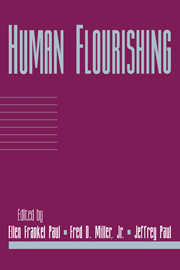Book contents
- Frontmatter
- Contents
- Introduction
- Acknowledgments
- Contributors
- Human Flourishing and the Appeal to Human Nature
- The Three Faces of Flourishing
- Flourishing Egoism
- The Idea of a Life Plan
- Human Flourishing Versus Desire Satisfaction
- Happiness and Human Flourishing in Kant's Ethics
- Valuing Activity
- Ancient Perfectionism and Its Modern Critics
- Aristotle's Elusive Summum Bonum
- Eudaimonism, Love and Friendship, and Political Community
- No Families, No Freedom: Human Flourishing in a Free Society
- Politics, Neutrality, and the Good
- Human Flourishing and Universal Justice
- Index
Aristotle's Elusive Summum Bonum
Published online by Cambridge University Press: 05 October 2013
- Frontmatter
- Contents
- Introduction
- Acknowledgments
- Contributors
- Human Flourishing and the Appeal to Human Nature
- The Three Faces of Flourishing
- Flourishing Egoism
- The Idea of a Life Plan
- Human Flourishing Versus Desire Satisfaction
- Happiness and Human Flourishing in Kant's Ethics
- Valuing Activity
- Ancient Perfectionism and Its Modern Critics
- Aristotle's Elusive Summum Bonum
- Eudaimonism, Love and Friendship, and Political Community
- No Families, No Freedom: Human Flourishing in a Free Society
- Politics, Neutrality, and the Good
- Human Flourishing and Universal Justice
- Index
Summary
THE MAIN QUESTION
The philosophy of Aristotle (384-322, B.C.E.) remains a beacon of our culture. But no part of Aristotle's work is more alive and compelling today than his contribution to ethics and political science—nor more relevant to the subject of the present volume. Political science, in his view, begins with ethics, and the primary task of ethics is to elucidate human flourishing. Aristotle brings to this topic a mind unsurpassed in the depth, keenness, and comprehensiveness of its probing.
“Which among humanly practicable goods is the summum bonum or highest good?” is his first and central question. As we would expect, the answer he gives is rather abstract. Even so, he intends it to be informative and to provide guidance for action. The present essay will focus on the account put forward in the Nicomachean Ethics, Book I, chapter 7, where Aristotle equates the summum bonum with “the soul's activity of excellence in a complete life.” This compact formula sets the agenda for Aristotelian ethics, which proceeds to explicate the summum bonum through detailed studies of (a) the excellences (or virtues) and (b) the two most philosophically controversial components of a complete life, namely friendship and pleasure. Fully spelled out, the compact formula yields a conceptually rich, and substantial, ideal.
- Type
- Chapter
- Information
- Human Flourishing , pp. 233 - 251Publisher: Cambridge University PressPrint publication year: 1999
- 1
- Cited by



